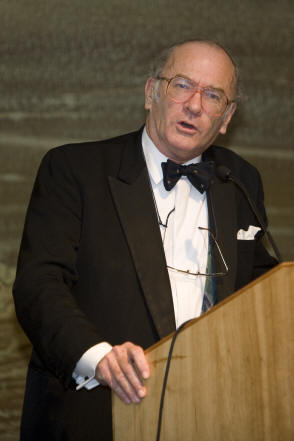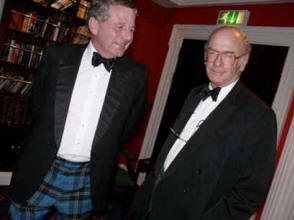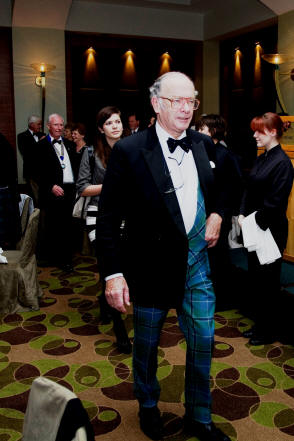|
Edited by Frank R. Shaw, FSA Scot, Dawsonville, GA, USA
A Warm
Welcome to Professor David Purdie, MD, FRCP ED, FSA (Scot)
Celebrating the 250 anniversary of the birth of Robert Burns is a thing of
beauty, and a thing of joy, particularly for those of us who are proud to be
called Burnsians! With all of the Immortal Memories, songs, and toasts
honoring Burns this anniversary year, it is evident that his popularity
continues to grow by leaps and bounds year after year. Our poet is more
popular today that ever before. He is truly a man for all seasons. I cannot
think of Scotland without thinking of Robert Burns. With these thoughts in
mind I have asked Dr. Purdie to allow me the privilege of presenting this
article on Burns that first appeared on The Scotsman.com earlier this month.
For those
of you who do not know Dr. Purdie, he is a Fellow of the Royal College of
Physicians of Edinburgh and a Fellow of the Society of Antiquaries of
Scotland. As a celebrated public speaker, his highly amusing speeches are in
great demand for charity and corporate functions. As an experienced speech
writer, Professor Purdie is also available as a speech writer and a speech
editor. He is well known for documentary voiceover and narration.
He has but
one golden rule as an after dinner speaker – “Leave them wanting more…”.
Those who
should know have endorsed him as…
“Arguably
our finest after-dinner speaker of the moment” – Lewine Mair in The Daily
Telegraph
“Articulate, funny and spot-on with content and delivery…one of the most
magnificent speakers I have ever heard.” Sam Torrance in Sam, the
Autobiography.
As
important as all of his accomplishments are, Dr. Purdie is proud to have the
opportunity to serve as the current Secretary of the Edinburgh Burns Club.


Dr. Purdie
and I have exchanged emails in the past regarding Sir Walter Scott and it is
a pleasure to do the same now regarding Robert Burns. It is my distinct
honor to present to our readers his article entitled:-
What Burns Means to Me.

The Bible
upon which Barack Obama swore his oath on Tuesday was that of Abraham
Lincoln. That Bible lay on the bedside table every night that Lincoln spent
in the White House, but it was not alone. Beside it lay his copy of the
collected works of Robert Burns, many of which Lincoln knew by heart, having
learned them as a child in the family cabin in Missouri.
And that
is what the poet says to me. That great lyric poetry with its graphic
imagery and verbal firepower may cross oceans and still penetrate to the
innermost labyrinth of the human heart.
Our poet
showed us that a Scots farmer might write an anthem for the common man -
that for all the strife and fury of the world, a Man is a Man - for all
that. This brave singer cut though the cant and the posturing to insist
that there is a benevolence within us which he caught and gave to humanity
in that great Song. My friend Sheena Wellington rose and sang it before the
Queen and the newly summoned Parliament in Edinburgh and none that heard her
- and Burns that day - will ever forget it.
He says to
me that true worth lies not in inherited wealth or acquired position in
society, not in strength of intellect nor yet in the power of a voice. It
lies, rather, in the space within the heart which we reserve for the weal
and the welfare of our fellow men. As he wrote to his friend Davie Sillar,
“The heart’s aye the part, aye, that maks us richt - or wrang…”
He also
says to us - whatever the hardships, pay your dues. No man or woman either,
did Burns a great favour and lived to regret the day. To young Jenny
Cruikshank at whose harpsichord he weaved the words of his songs into the
old airs of Scotland, he gave a copy of his Poems and for her he wrote the
great song “Rosebud by my early Walk”. To Robert Fergusson, poet of
Edinburgh, he gave a stone for his unmarked grave - and to faithful, stoical
Jean Armour he gave her immortality.
Our
emigrants would place the works of Burns in the family kist when they packed
to go on their long voyages to North America, or to the Cape and over the
southern ocean to Australia and New Zealand. And it was not just because he
spoke and sang to them in the accents of home. It was because Burns always
has something to say, to the struggling farmer, to the uncertain lover, to
the young soldier facing his first action. And what he says in a score of
ways has this constant, insistent refrain; Courage, brother, do not falter –
and never, ever, despair.
He places
before us one of the great stories of our long history. How a child born in
a two-roomed cottage which sits by an Alloway roadside became the man now
regarded by modern critical scholarship as one of the finest poets and
songsmiths ever to lift a pen. Among us for such a short time, he was gone
at 37 leaving a desolate widow, no child above the age of ten - and a body
of verse which will ever remain one of the jewels in the crown of our
literature.
And far
beyond our homeland, a great President freed the slaves and showed us how
Robert Burns’s poems and songs, first laid before his family and neighbours
in the farmlands of Ayrshire, were to become the property - and the
patrimony - of Mankind.
(FRS:1.30.09) |

